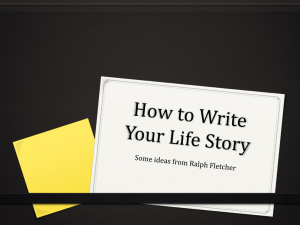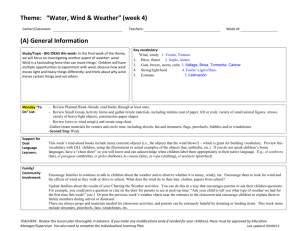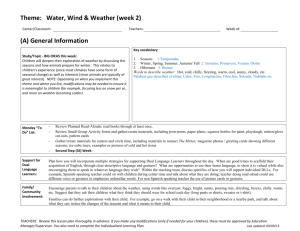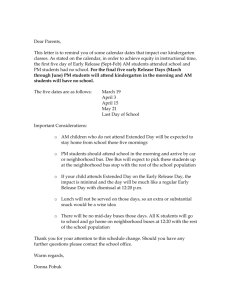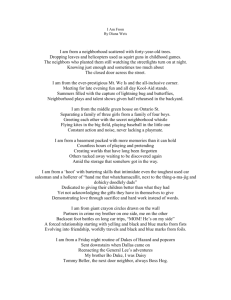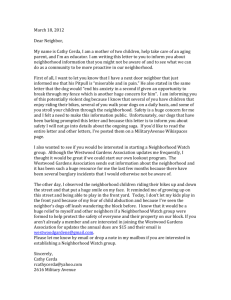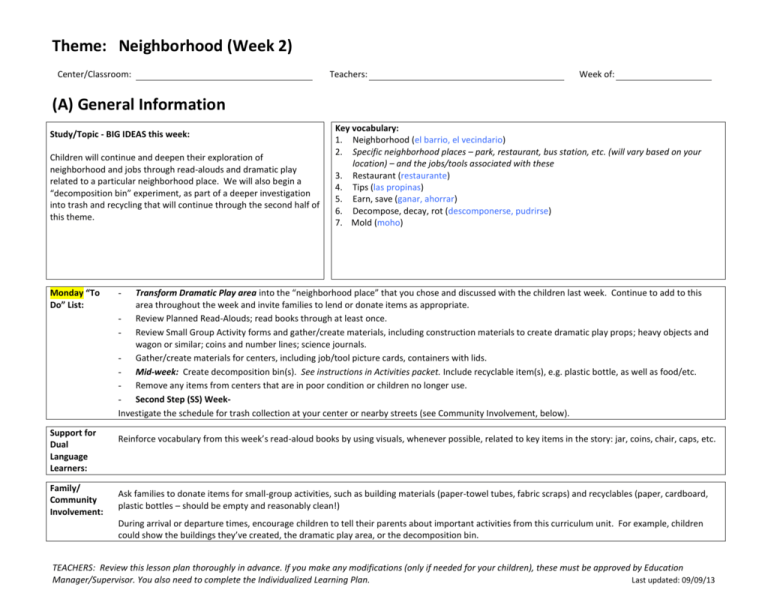
Theme: Neighborhood (Week 2)
Center/Classroom:
Teachers:
Week of:
(A) General Information
Study/Topic - BIG IDEAS this week:
Children will continue and deepen their exploration of
neighborhood and jobs through read-alouds and dramatic play
related to a particular neighborhood place. We will also begin a
“decomposition bin” experiment, as part of a deeper investigation
into trash and recycling that will continue through the second half of
this theme.
Monday “To
Do” List:
Support for
Dual
Language
Learners:
Family/
Community
Involvement:
Key vocabulary:
1. Neighborhood (el barrio, el vecindario)
2. Specific neighborhood places – park, restaurant, bus station, etc. (will vary based on your
location) – and the jobs/tools associated with these
3. Restaurant (restaurante)
4. Tips (las propinas)
5. Earn, save (ganar, ahorrar)
6. Decompose, decay, rot (descomponerse, pudrirse)
7. Mold (moho)
Transform Dramatic Play area into the “neighborhood place” that you chose and discussed with the children last week. Continue to add to this
area throughout the week and invite families to lend or donate items as appropriate.
- Review Planned Read-Alouds; read books through at least once.
- Review Small Group Activity forms and gather/create materials, including construction materials to create dramatic play props; heavy objects and
wagon or similar; coins and number lines; science journals.
- Gather/create materials for centers, including job/tool picture cards, containers with lids.
- Mid-week: Create decomposition bin(s). See instructions in Activities packet. Include recyclable item(s), e.g. plastic bottle, as well as food/etc.
- Remove any items from centers that are in poor condition or children no longer use.
- Second Step (SS) WeekInvestigate the schedule for trash collection at your center or nearby streets (see Community Involvement, below).
-
Reinforce vocabulary from this week’s read-aloud books by using visuals, whenever possible, related to key items in the story: jar, coins, chair, caps, etc.
Ask families to donate items for small-group activities, such as building materials (paper-towel tubes, fabric scraps) and recyclables (paper, cardboard,
plastic bottles – should be empty and reasonably clean!)
During arrival or departure times, encourage children to tell their parents about important activities from this curriculum unit. For example, children
could show the buildings they’ve created, the dramatic play area, or the decomposition bin.
TEACHERS: Review this lesson plan thoroughly in advance. If you make any modifications (only if needed for your children), these must be approved by Education
Manager/Supervisor. You also need to complete the Individualized Learning Plan.
Last updated: 09/09/13
Investigate opportunities for children to see trash/recycling in action during the final week of this theme; Could you go outside on a certain day/time to
see trash being collected on your street? Perhaps you can even convince the garbage/recycling collector to take a quick break to talk to the class!
(B) Materials to Enhance Children’s Play
Blocks
Dramatic Play
Toys and Games
Add:
Add:
Add:
Buildings children created last week (from milk
cartons, etc.)
“Neighborhood Place” – Create the community
place that you discussed with children last week –
doctors’ office, restaurant, fire station, etc.
Picture cards showing community jobs and their
corresponding vehicles/tools. (See Activities packet
from Week 1 of this theme; make two copies for
children to sort, match, etc.)
Photos of children’s block play last week and/or from
your neighborhood walk
Add signs, costumes or props to support children
in dramatic play related to this theme.
See also “Neighborhood Props” small-group
activity.
Art
Pennies or other coins, number lines, baggies – see
“Counting Coins” small-group activity
Library/Writing
Keep any items from previous week(s) that children
were particularly engaged with.
Discovery/Science
Add:
Add:
Read-aloud books for this week
Mid-week – “Decomposition Bins” to observe – see
guidance in Activities packet and at
http://www.exploratorium.edu/science_explorer/mold.html
Journals for recording/drawing observations
Sand and Water
Add:
Music and Movement
Computers
Add:
http://pbskids.org/sid/mysterylunchbox.html
Containers with lids, such as oatmeal containers,
coffee cans, or cups with lids. Children can use
these “drums” for free exploration, or provide
music for them to accompany.
Children can watch food decay by clicking on a
timeline, looking closer through a virtual magnifying
glass, and hearing Sid describe his observations.
http://www.youtube.com/watch?v=pCD4h8Pp7qM This
catchy “Decay Song” includes multiple images of
fruits and vegetables decomposing.
Outdoors
Cooking
Extend the Dramatic Play “neighborhood place” into outside time, if possible. Engage children in deciding
which items and props they could take outdoors!
(C) Group Experiences
© 2012 Acelero, Inc. All Rights Reserved. Uses are subject to the limitations set forth in your user agreement. Your right to use these materials is contingent upon remaining a current
SARGE subscriber with Acelero, Inc.
Monday
Arrival
Opening
Circle
Movement
Relaxation
Transitions
Closing
Circle
Tuesday
Wednesday
Thursday
Friday
Arrival: Attendance graph
Arrival: Attendance graph
Arrival: Attendance graph
Arrival: Attendance graph
Morning Circle:
Welcome song & one other
Morning Circle:
Welcome song & one other
Morning Circle:
Welcome song & one other
Morning Circle:
Welcome song & one other
Review daily schedule and
rules now and throughout
the day
Review daily schedule and
rules now and throughout
the day
Review daily schedule and
rules now and throughout
the day
Review daily schedule and
rules now and throughout
the day
Puppet Script
Discussion: What have we
learned about jobs? Revisit
KWL chart (from last week)
and fill in final column.
Morning Message:
There are 3 things in our
decomposition bin:
1. Bread
2. Apple
3. Plastic bottle
I wonder if any of them
have changed?
Customize this message as
appropriate. You can write
it in front of children (with
their help), or have written
in advance. Time
permitting, engage children
in noticing concepts of
print, such as which
direction to read, a word or
letter they recognize, etc.
SS-Skill Practice Activity-
Previewing dramatic play:
Remind children of last
week’s discussion about
having a neighborhood
place in Dramatic Play.
Show a few new items
you’ve added to this area.
Preview small-group time:
“You will be able to make
things to use in our new
_____ today or tomorrow!”
Transition: Question of the
Day (QOTD): Where did
you go in the neighborhood
this weekend? (Store/park/
church – or other choices
that make sense for your
class) Have children
answer during transition,
charting with whiteboard/
pocket chart/etc
Transition: SS-Brain Builder
Music/Movement: SS“Everyone has Accidents” &
one other
Relaxation:
Transition: Jack or Jill in the
Box (Transition magician
page 76)
Closing Circle:
Goodbye song
Transition:
Music/Movement: SS Song
of the week & one other
Transition:
Music/Movement: Choose
2
Relaxation:
Transition: SS-Brain Builder
Closing Circle: Debrief
Dramatic Play: Talk about
what children have been
doing in the “neighborhood
place” this week. If
possible, show some
photos you’ve taken of
children playing there, and
ask children to describe
what they’re doing in these
pictures. Use language
related to jobs, tools, etc.
Goodbye song
Relaxation:
Music/Movement: SS Song
of the week & one other
Transition:
Relaxation:
Transition:
Closing Circle:
Goodbye song
© 2012 Acelero, Inc. All Rights Reserved. Uses are subject to the limitations set forth in your user agreement. Your right to use these materials is contingent upon remaining a current
SARGE subscriber with Acelero, Inc.
Closing Circle:
Review QOTD results with
the full group, counting
each column and writing
the numeral.
Goodbye song
ReadAlouds
Group 1: Caps for Sale by
Esphyr Slobodkina
Group 1: Dumpster Diver
Group 1: SS Book-
(first read-through; focus
on children’s
comprehension of problem
and resolution)
Group 2: Caps for Sale by
Esphyr Slobodkina
Group 2: SS-Story and
Discussion
Group 2: Dumpster Diver
SmallGroup
Activity
Group 1: – Neighborhood
Props
Group 2: – “Decomposition
Bin” – Decomposition: Part
1-Show children the bin/jar,
explaining that this will
help us see what happens
to things that people throw
in the garbage! Ask children
what they think will happen
to the food/items in the
jars in a day… a few days…
next week? Introduce
vocabulary words –
“decompose,” “mold.”
For instructions, see
http://www.exploratorium.
edu/science_explorer/mold.
html
Group 1: SS-Story and
Discussion
Group 2: SS Book-
(first read-through; focus
on children’s
comprehension of problem
and resolution)
Group 1: “Decomposition
Bin” – Decomposition: Part
1-Show children the bin/jar,
explaining that this will
help us see what happens
to things that people throw
in the garbage! Ask children
what they think will happen
to the food/items in the
jars in a day… a few days…
next week? Introduce
vocabulary words –
“decompose,” “mold.”
For instructions, see
http://www.exploratorium.
edu/science_explorer/mold.
html
Group 1: SS-Skill Practice-
Group 1: – Counting Coins
(see activity guide)
Group 2: – Counting Coins
(see activity guide)
Group 2: SS-Skill Practice-
Group 2: Neighborhood
Props
© 2012 Acelero, Inc. All Rights Reserved. Uses are subject to the limitations set forth in your user agreement. Your right to use these materials is contingent upon remaining a current
SARGE subscriber with Acelero, Inc.
Special
Activities
Tangible
Acknowledgement System:
Outside
Inclement Weather Plan:
Monkey See, Monkey Do:
Have children imitate your
gestures, starting with ones
from Caps for Sale (shaking
fist; stamping one or both
feet), and then adding
other gross-motor
movements. You can add a
phrase such as “Monkeys,
monkeys, do like me!” Also
let children take turns as
the leader.
© 2012 Acelero, Inc. All Rights Reserved. Uses are subject to the limitations set forth in your user agreement. Your right to use these materials is contingent upon remaining a current
SARGE subscriber with Acelero, Inc.
Individual Child Planning Form
School Readiness Goal
Focus Domain(s)
Physical
Approaches to
Learning
Language &
Literacy
Cogn./ Gen.
Knowledge
Name
Soc-Emotional
Focus
Date
Child’s
Week of:
Strategy/Activity
Focus TS
GOLD
Objective(s)
Why Chosen?
(IFSP, TS Gold Report,
family input, conference
goal, etc.)
NOTE: Children with similar needs may benefit from
differentiated instruction (e.g. during small-group activity).
You can use the “Small Group” column at right to make notes
about possible groupings.
Example: 1. Routine – activity, state how you are
individualizing for this child.
CHECK when
implemented
Teachers:
Possible small-group?
Center/Classroom:
1.
2.
3.
1.
2.
3.
1.
2.
3.
1.
2.
3.
1.
2.
3.
© 2012 Acelero, Inc. All Rights Reserved. Uses are subject to the limitations set forth in your user agreement. Your right to use these materials is contingent upon remaining a current
SARGE subscriber with Acelero, Inc.
1.
2.
3.
1.
2.
3.
IFSP Child Planning
Child’s Name
IFSP Goals
Classroom Plan: What’s the Activity/Who’s Supporting the Child
*Please review all IFSP plans including Speech Only to ensure implementation of all classroom goals.
*For speech goals the what/who would be: Directed by the Speech Language Therapist
© 2012 Acelero, Inc. All Rights Reserved. Uses are subject to the limitations set forth in your user agreement. Your right to use these materials is contingent upon remaining a current
SARGE subscriber with Acelero, Inc.


